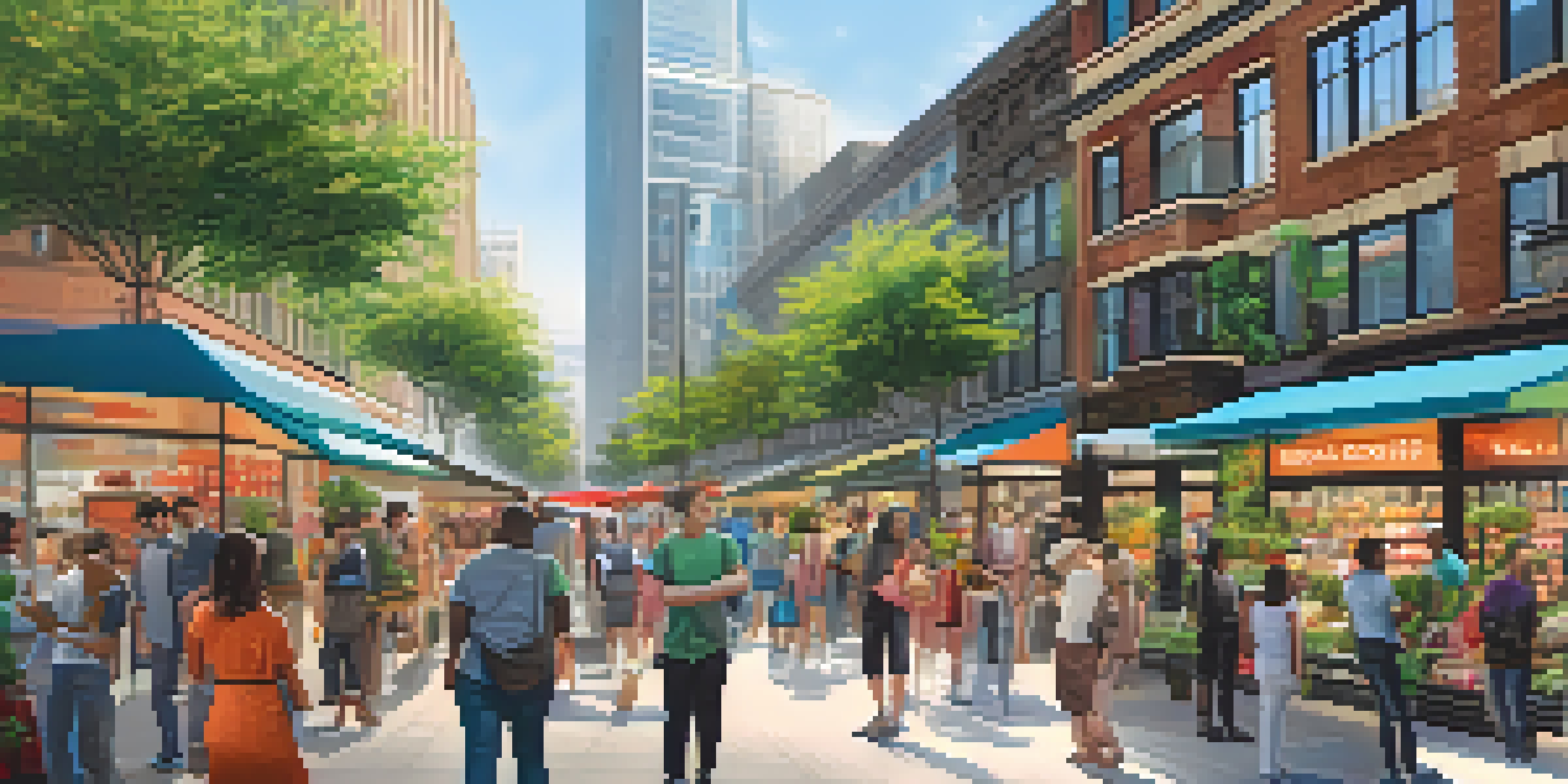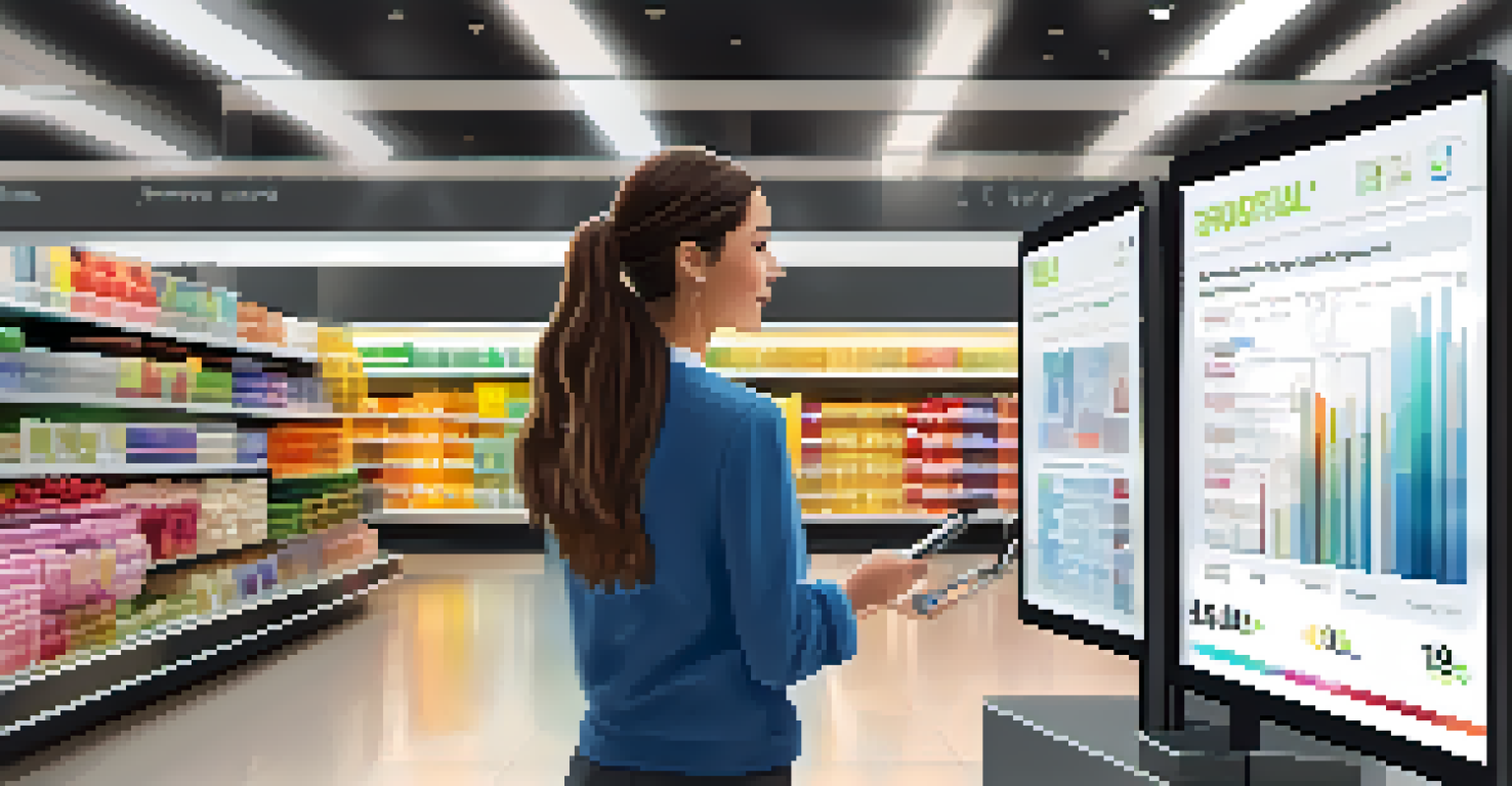The Evolution of Urban Retail in Smart City Contexts

Understanding Smart Cities and Urban Retail
Smart cities blend technology and urban planning to enhance residents' quality of life. In this context, urban retail evolves to meet new consumer expectations shaped by digital advancements. Retailers are increasingly integrating smart technology, such as mobile payment systems and personalized shopping experiences, into their offerings.
Sustainability is no longer about doing less harm. It's about doing more good.
This shift not only improves convenience for shoppers but also allows businesses to gather valuable data on consumer preferences. By understanding shopping patterns, retailers can tailor their offerings and marketing strategies effectively. Thus, smart cities are redefining how urban retail operates in a competitive environment.
As we explore this evolution, it becomes evident that the synergy between technology and retail is not just beneficial for businesses but also enriches the consumer experience. This sets the stage for examining specific trends that have emerged in urban retail within smart city frameworks.
The Role of Technology in Urban Retail Transformation
Technology is the backbone of smart city initiatives, and its impact on urban retail is profound. From interactive kiosks to augmented reality shopping experiences, technology enhances how consumers engage with brands. Retailers are leveraging these tools to create immersive experiences that draw customers in and keep them coming back.

For instance, using smartphone apps, shoppers can receive real-time updates on sales and promotions while navigating through a mall. This integration of technology not only streamlines the shopping experience but also provides retailers with instant feedback on consumer behavior. As a result, businesses can adjust their strategies swiftly to meet market demands.
Technology Transforms Urban Retail
Smart cities leverage technology to enhance shopping experiences and streamline interactions between consumers and retailers.
Moreover, the rise of e-commerce has pushed brick-and-mortar stores to adapt and innovate. Retailers are now blending online and offline experiences, often referred to as 'omnichannel retailing.' This shift highlights how technology is not just an accessory but a core component of modern urban retail.
Sustainability Trends in Smart Urban Retail
Sustainability has become a significant focus for urban retail, particularly within smart city frameworks. As consumers become more environmentally conscious, retailers are responding by adopting sustainable practices. This includes everything from using eco-friendly materials in packaging to implementing energy-efficient technologies in stores.
The best way to predict the future is to create it.
In smart cities, sustainability is often integrated into the overall urban planning process. For example, many cities are promoting local shopping initiatives that reduce carbon footprints and support community economies. Retailers that align with these values not only attract eco-conscious consumers but also enhance their brand reputation.
Additionally, smart cities often provide infrastructure that supports sustainable retail, such as efficient public transportation systems and green spaces. This makes it easier for consumers to shop locally and encourages businesses to adopt practices that benefit the environment. The result is a win-win scenario for both retailers and the communities they serve.
Consumer Behavior Shifts in Smart City Retail
The evolution of urban retail is closely tied to changing consumer behaviors in smart cities. With access to vast amounts of information at their fingertips, shoppers are more informed than ever. This shift has led to a demand for transparency from brands regarding product sourcing and business practices.
Moreover, consumers are increasingly valuing convenience and personalized experiences. Retailers are responding by leveraging data analytics to understand individual shopping preferences and deliver tailored recommendations. This not only enhances the consumer experience but also fosters brand loyalty.
Sustainability Drives Retail Practices
As environmental concerns rise, urban retailers are adopting sustainable practices that resonate with eco-conscious consumers.
As we look at these behavioral trends, it becomes clear that urban retailers must adapt to meet the evolving needs of their customers. Those who embrace these changes will likely thrive in the increasingly competitive landscape of smart city retail.
The Importance of Data Analytics in Retail Strategy
Data analytics plays a crucial role in shaping retail strategies within smart cities. By analyzing consumer data, retailers can gain insights into shopping habits, preferences, and trends. This information is invaluable for making informed decisions regarding inventory management, marketing campaigns, and product offerings.
For example, retailers can track which products are popular during certain times of the year and adjust their stock accordingly. Additionally, data analytics enables retailers to identify potential areas for growth or improvement, allowing them to stay ahead of the competition. The ability to predict consumer behavior is a game-changer in the retail industry.
In essence, data analytics not only helps retailers optimize their operations but also enhances the overall shopping experience for consumers. By utilizing data effectively, businesses can create more relevant and engaging interactions, solidifying their place in the evolving urban retail landscape.
Challenges Facing Urban Retail in Smart Cities
Despite the many advancements in urban retail, challenges remain, particularly in smart city contexts. One of the primary issues is the need for significant investment in technology and infrastructure. Smaller retailers may struggle to keep up with larger competitors who have more resources to invest in cutting-edge solutions.
Furthermore, as technology becomes more integrated into retail, concerns over data privacy and security become paramount. Consumers are increasingly wary of how their data is being used, and retailers must navigate these concerns carefully to maintain trust. Failure to do so could result in reputational damage and loss of customer loyalty.
Data Analytics Shapes Retail Strategy
Retailers utilize data analytics to understand consumer behaviors and preferences, optimizing their offerings and marketing strategies.
Additionally, the rapid pace of technological change can be overwhelming for some businesses. Retailers must continuously adapt to new tools and trends, which can be both time-consuming and costly. Addressing these challenges is essential for urban retailers to thrive in smart city environments.
Future Trends in Urban Retail Within Smart Cities
Looking ahead, several trends are likely to shape the future of urban retail in smart cities. One notable trend is the increased use of artificial intelligence (AI) to enhance customer experiences. AI can help retailers analyze consumer behavior, predict trends, and even automate customer service interactions.
Additionally, as smart cities continue to evolve, we can expect a greater emphasis on community-focused retail. This could manifest as more local businesses thriving in urban centers, supported by initiatives designed to promote local shopping. Such a shift would not only bolster local economies but also foster a sense of community among residents.

Finally, as sustainability becomes a core value for consumers, we can anticipate that urban retailers will increasingly prioritize eco-friendly practices. This could lead to innovative approaches to shopping that minimize waste and promote environmental responsibility. The future of urban retail in smart cities will likely embody a balance between technological advancement and social consciousness.